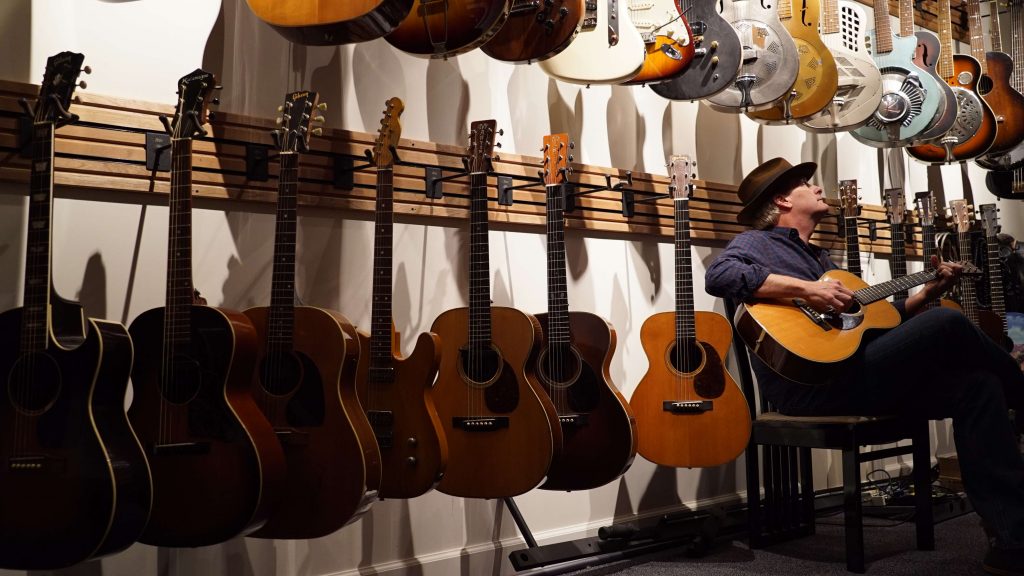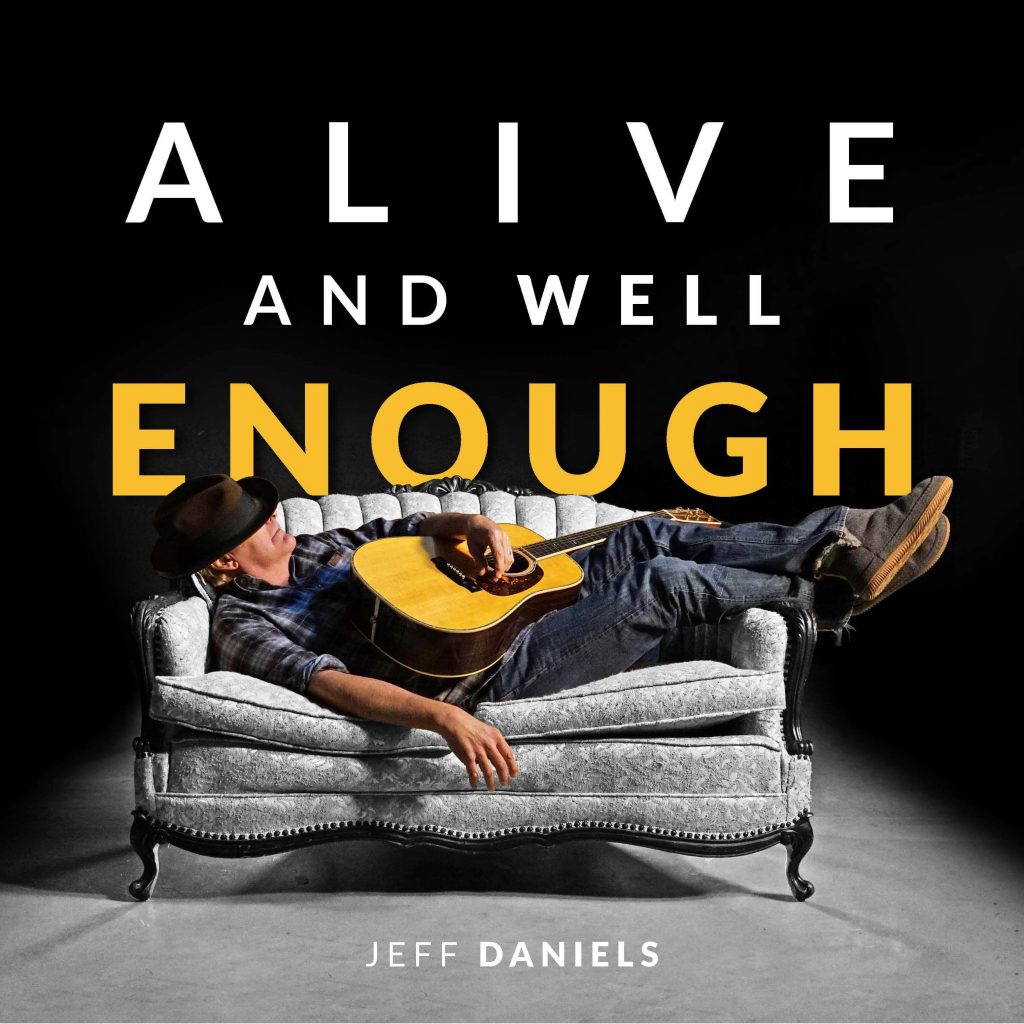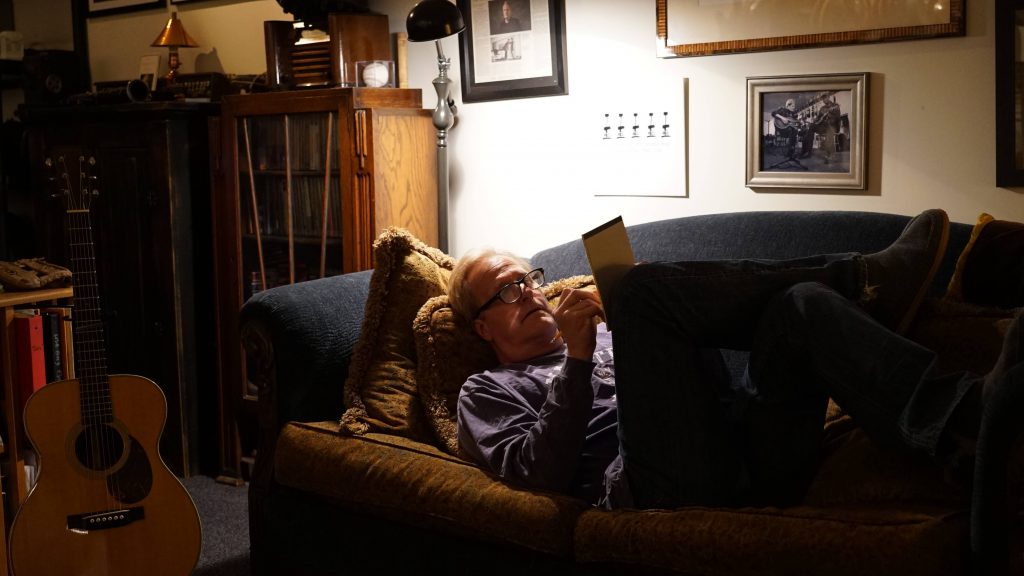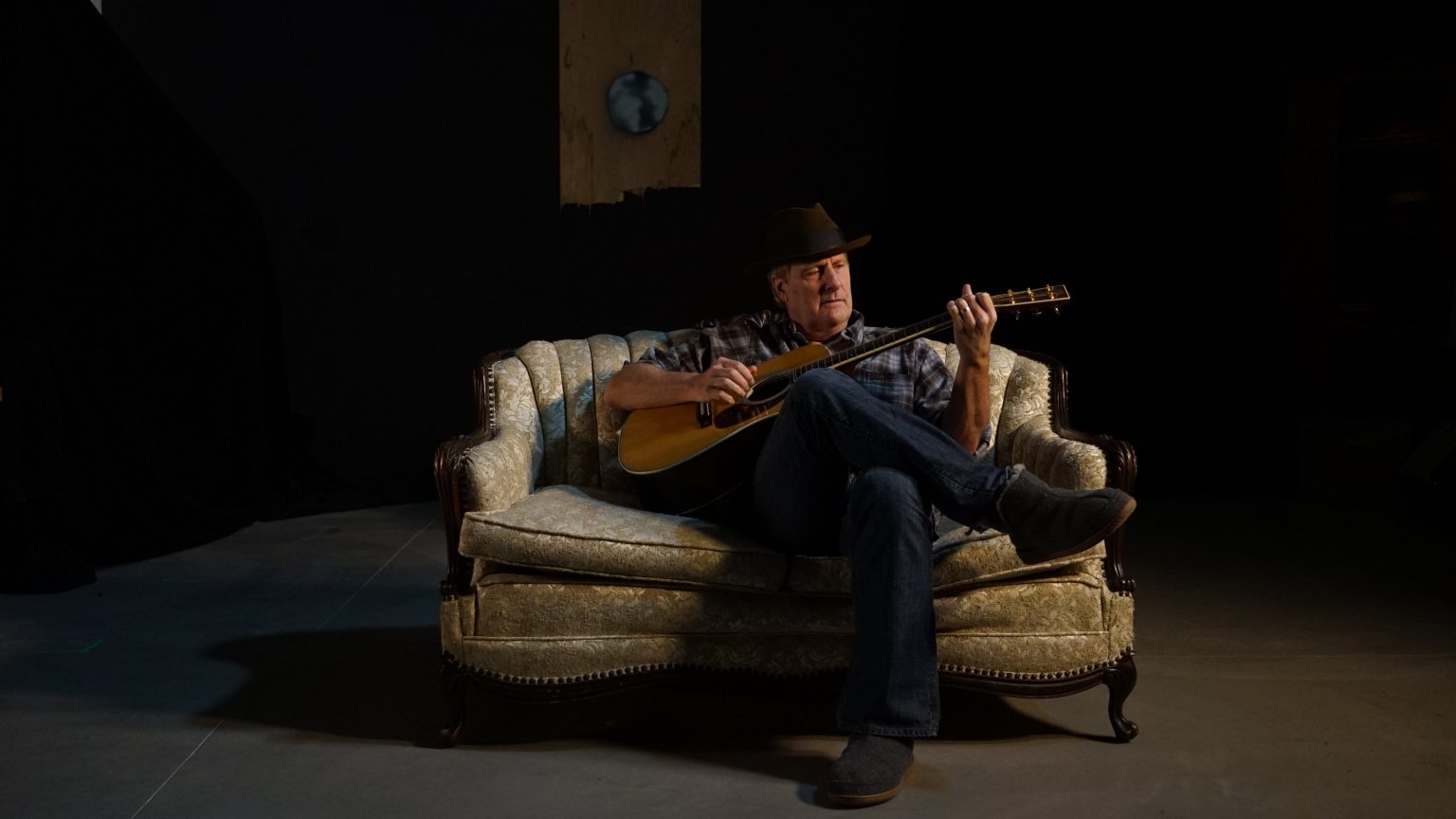After having appeared in over seventy films, many television shows, and returning again and again to theater, Jeff Daniels is acting more now than he ever has in any other decade of his career. What’s more interesting about this 2x Emmy-winner, who has acquired roles of a lifetime (Terms of Endearment, Woody Allen’s The Purple Rose of Cairo), is that he is now reaching a creative apogee in all spheres of his life: Stage, screen, and music.
For as much as he loves it, and brilliant as he is at it, acting is not what is most central to his artistic process. In 1976, Daniels dropped out of college and set out for New York City to further pursue acting. He soon realized that Guild D-40 acoustic guitar in the back of his beat up Buick was his best friend, the one thing that keeps his creative heart beating.

“Jim Carrey talks about that,” Daniels tells me about the time he told Carrey he wanted out. “I was going, ‘I think I’m going to get out. Just gonna play guitar, play clubs, and call it. He goes, ‘No, you can’t, man. You can’t. We have a gift. We have to keep doing it.’ He said, ‘Besides, you’re creative. You can’t stop. You have to be doing something.’ I told him when we were promo-ing Dumb and Dumber To together, I said, ‘Why are you still doing this? Go paint. Move to England for a year. Get a studio and just paint.’ I mean, my god, I’ve got this recording studio. I’ve got my plays at my theatre, and I’ve got my guitar. That’s when I’m happiest. The acting? Occasionally, you get the great role, and I’ve had a string of them lately. But it’s a job sometimes. You’re doing that movie because you got to pay the bills.”
But Daniels did heed his Dumb and Dumber co-star’s exhortation. “The point was we have to keep doing it. It’s the thing.” He recalls his father, once the mayor of Chelsea, Michigan, Daniels’ hometown where he founded his Purple Rose Theatre and where he still lives. “He was 83, still running the lumber company like he was 30. I’m going, ‘Dad, what are you doing?’ He goes, ‘I have to. I have to keep going.’ And he talked about guys that he had seen who were older than him who stopped. They retired and ended up watching Kelly and Ryan in the morning. He said they just died. They were dead within a year. He said, ‘I just love it. I still love it.’ I think that’s what creating — whether it’s a play or a song on the acoustic guitar or acting a role — it’s all part of the same thing for me.”
He still has the D-40. “Yeah, the neck is so skinny I can’t stand it. I kick myself. I remember, I had a Gibson. I looked at a Gibson and then the Guild D-40. I don’t know why. Nothing against Guilds, but Gibson I think was still being built in Michigan, in Kalamazoo at that point. I just didn’t make the connection. Yeah, it’s there. I’ll never get rid of it.”
Following a succession of yet more singular screen roles (Newsroom, Godless, Looming Tower, The Comey Rule, and a yearlong stint as Atticus Finch in Aaron Sorkin’s stage adaptation of To Kill a Mockingbird), he is poised to release his latest album. Alive and Well Enough is now available on his site and will be available on iTunes, Spotify & Pandora on Dec 12. If there is a concept within the album, it’s that each song tells a unique story.

In the viral hit “Trumpty Dumpty Blues,” Daniels toggles between his own singing and audio excerpts of Trump’s carnival barking comments on the coronavirus “hoax” — lip syncing statements like, “No, I don’t take responsibility at all” and singing in riposte lines such as, “Just like that apple fell for Isaac Newton, so did Trump for Vladimir Putin.” From his coruscating pen is an indictment of the mishandling of the pandemic, a folk-blues song that in its catchy refrain and vocal levity contains an inner logic and grim truth. Daniels, as an actor and playwright, explains that in drama there is truth.
“But the best comedy is steeped in truth.”
There’s comedy in the timing and delivery of the impersonation, truth in Daniels’ steely gaze. “When you hit on an idea like ‘Trumpty Dumpty Blues,’ suddenly you realize it’s all up to Jared. That’s true. Now you know how we feel, you fuck.”
Folk singer-songwriters like Steve Goodman, Arlo Guthrie, and Phil Ochs jumpstarted Daniels. “Guys like Tom Paxton, David Bromberg that weren’t aiming necessarily at Billboard or Nashville where someone would record your song,” he elaborates. “They were writing to write; they were writing to say something.” Also tuning in to Woody Guthrie, he learned the guitar is mightier than the sword. “You can use art as a weapon.”
In the opening scene of HBO’s Newsroom, Daniels’ anchor character Will McAvoy is asked at a university symposium why America is the greatest country in the world. He offers a litany of facts pointing toward why we are in fact not, before morosely describing how we used to be: “We aspired to intelligence, we didn’t belittle it; it didn’t make us feel inferior. We didn’t identify ourselves by who we voted for in our last election.” Newsroom shined a candid light on, well, the newsroom — presenting an honest look at the news and its anchors who are caught daily in the fray of ethics versus ratings.
In a post-truth era where YouTube videos on social platforms pass as news, science is sidelined and doctors and nurses ignored, we seem to have lost what’s true and what’s not. It’s been said that the only thing necessary for the triumph of evil is for good men to do nothing. “That used to be the guardrail,” he tells me, “and now if it’s on the internet it’s true. I think we lost something there. Even with the Trump thing and the republicans that are complicit with their silence.”
He continues, “Even somebody as right as Barry Goldwater knew when it was time, knew when Nixon was crossing the rule of law and breaking the law and that they could no longer stand for it. They walked up to the White House and said you have to resign. We don’t have those people anymore. So, that’s a big, big problem. And that’s the main one, and that people get their information from places that tell people what they want to hear. Because there’s money in telling people what they want to hear. My hope is that with this change with administration we’ll get back to truth and honesty and decency and civility and compassion. Things like that. I hope we can get back to that. I think that the majority of American people want that. It’s not going to happen on January 20th. That’s for sure. It’s going to take a while.”
The music platform, he tells me, is “a clever use of the celebrity. ‘Oh, I liked him in Dumb and Dumber,’ or ‘I liked him in Newsroom. I’ll get his album and then it’s not Dumb and Dumber and it’s not Newsroom. It’s something else.’ Daniels analogizes the sonic canvas to the painter’s canvas, and has utilized the age of setting up one’s own website and record label. “When I write and record, I don’t have a committee of people standing over me and my painting saying, ‘Try more red.’ it’s just me. And it’s a reaction of having gone through Hollywood where a lot of people have their hands on the scripts, even the actors on their way to the set are rewriting speeches.
“There’s this lack of respect for the written word. I came out of the New York Theater where you did not change a word of Lanford Wilson’s play. And if you wanted to, you asked first. And you were usually told no. It was the same thing with Aaron Sorkin. Having gone through a bunch of movies where we’ve got a bunch of rewrites. Who? Well, one of the producers that you’ve never met, but he’s somewhere re-writing stuff. And you’re going, oh, ok. How am I supposed to say this? This is not that. This is just me having complete creative control. Whether it’s over the album — with the help of my son and Steve Curran who are terrific and have been with me forever doing this kind of thing. I get to write for me and this is what this album feels like. It’s me writing the album for me that I want, before I can’t play anymore.”
Some precepts he applies to acting he finds also appeal to his musicianship — like memorization, which according to Daniels comes easier if you are musical. “I think it’s the rhythm and great writers, like Sorkin, have a rhythm. If you aren’t musical, it’s like square wheels. But if you are, I’ve noticed that that kind of flows. The performance of songs is similar, too. It takes 100 shows to get on top of it, where you’re not thinking about the next line or how should i do this or how should i do that? Brian Denehy told me one time — I was doing Mockingbird. I saw him at an event and I said, ‘Brian, tell me how to get through a yearlong run of the same show eight times a week.’ And he goes, ‘Let it take you. Just don’t think about it and when you walk on at 8:00 let it take you.’ That’s what 100 shows does, and that’s what 100 performances or repetition of playing that one song over and over and over again by yourself.
“And there’s a breaking in period in front of a live audience. And then you own it. Then you’re on top of it. Then you can do with it what you want without worrying about whether you’re going to know the next verse or next chord or next line of the speech.”

Film acting is the ability to pull the audience into you; stage acting is another kind of presence altogether. Daniels’ qualifications both as a film and stage actor afford him the ability to manipulate the music audience. “Stage acting you’re going out whether you’re going to 200 people or whether you’re going to the balcony at the Shubert Theatre. You’re going out. When you put a camera there, you can then afford to pull them in to you. You got to have that presence and then know how to use it and pull them in and let them out, pull them in and let them out. I love that part of it.”
He remembers Utah Phillips as the best example he ever saw. “Jim Fleming, my agent, repped Utah before he passed away. Utah was going to play The Ark in Ann Arbor. Jim said, ‘You need to come and see him. You might see some familiarities.’ I went and he opened with ‘The Great Railroad Divide,’ this 15-minute song he keeps interrupting himself and telling this story and that one and going off on that side street and coming back to the chorus, and again. He owned the audience. I told Fleming, ‘That’s the best bit of improv I’ve ever seen.’ He says, ‘It’s not improv at all. Every word of it was written, and he’s been doing it for 20 years.’ “
Daniels knows how to tell a story and knows where the jokes are. Even if he riffs, he riffs off of something he knows he can come back to when setting up. “In my case ‘Dirty Harry Blues’ or something like that.” He cites Arlo as one of the master storytellers. “Certainly when I heard Alice’s Restaurant in the early 70s, I said, ‘What is that?’ Because that wasn’t Elton John or The Who. That was something completely different for me. You first have to have the ability to tell the story well, but then you have to have the technique and the craft where you take out words and you cut that line and you land it there. And then you’ve got it. And then it’s as precise as the song you’re about to sing.”
Another song on the album, “I Am America,” is a powerful track that sees him sharing soulful vocals with Detroit blues queen Thornetta Davis, and marks his second campaign video made with bestselling author Don Winslow and Shane Salerno (one of the producers on The Comey Rule). Daniels narrated “America Needs Michigan,” modeled after Winslow’s effort “America Needs Pennsylvania,” set to Bruce Springsteen’s “Streets of Philadelphia.”
NEW VIDEO: #AmericaNeedsGeorgia TURN VOLUME UP!!
With @Jeff_Daniels and the amazing @THORNETTAD
REAL CHANGE begins with @ossoff & @ReverendWarnock.
We need your help. We need 17,500 RETWEETS TODAY! pic.twitter.com/cPwot35JWv
— Don Winslow (@donwinslow) November 17, 2020
As opposed to the country that “sleptwalk” through the election in 2016, more people were gearing up for this election. “There were a lot of people who didn’t — weren’t as active back then that were bound and determined to at least go down being active this time. Don and Shane were two of those people, and they had been talking to me about videos they made. And when the Springsteen one came out about Pennsylvania, I said ‘There you go. That one.’ I said, ‘We don’t need any more videos about how much we hate Trump. You’re preaching to the choir for those people who hated him. You got to aim at the people in the middle. You got to convince those people that are republicans but can’t vote for Biden because he’s democrat, or that never voted democrat before, or they just aren’t paying attention. And the Pennsylvania video did that.
“I wrote Don and said, ‘You do one like that for Michigan and I’ll narrate it.’ So they had it in three or four days, and we recorded it here at 2188. I like to think it helped. It at least got people thinking it’s not just right or left — It’s decency, it’s truth, it’s honesty. It’s all that stuff. Put that on the ballot. I did. And I voted for Joe Biden. So, that’s what the video said. It got 5 million views, which is great. I needed one more song for the album.”
Inspired by Isabelle Wilkerson’s Caste: The Origins of Our Discontents — which examines the effect of racial hierarchy on our culture and how a caste system determines access to resources or lack thereof — “I Am America” is Daniels’ anthemic response to structural inequality. “It should be required reading for every white American. We have to unite. I knew I needed somebody great, and I wanted it to be their song. It starts as the two of us, but it becomes theirs. We called Thornetta and she agreed. She rewrote all her stuff, which was great. There’s your co-writer.”
In Harper Lee’s novel To Kill a Mockingbird, Atticus Finch truly believes there is good in everyone from beginning to end. In Aaron Sorkin’s play, that belief system gets challenged. ”A lot of the things Atticus deals with in the play is what a lot of America has to deal with this afternoon.”
Near the end of the closing argument, he turns to the audience (who have just become the jury) and recites a powerful and timely Sorkin line: “We have to heal this wound or we will never stop bleeding.” I like to think Daniels isn’t typecast for these heroic roles, so much as he genuinely represents the better angels of our nature.
He distills his very existence into song, often marking critical moments in his life. “Some of them are written just for me, to go into the notebook and make a demo recording of it for the kids when I’m gone. That kind of thing.” But then there are the moments like “All Rise,” the closing song for To Kill a Mockingbird, written as a sort of testimonial for the cast — his companions in arms. What felt like forever was suddenly in his rearview mirror, so he left the cast and himself with a musical keepsake. “All Rise” is also featured on Alive and Well Enough. “And that’s not something you’d put on an album, unless you’re me. No, this is a moment. And I’ll let you behind the scenes of what we were all going through after a yearlong run.” Four-hundred and fifteen performances, eight a week. He never missed one. “I got to that last curtain call, and I all but planted a flag.”
Alive and Well Enough is what Daniels calls his best foot forward, forty years of fine-tuning his fingerstyle guitar techniques and songwriting craftsmanship in between all those movies, plays and shows. “I stayed at it, and I worked real hard on the writing.

“It’s like doing a great take, in Newsroom for instance. You get to the end of the take, and if you were so in the moment between action and cut, when they say ‘Cut’ you don’t remember what you just did. You were so in it that you were bouncing off the other actor. And that’s the beauty of it. And this is that album. This is everything I had into the writing and the acoustic guitar playing, and I barely remember doing it. It’s that same thing. I let it take me, and this is where it took me.”
What would Will McAvoy say today?
“Well, first of all he would learn the chords and lyrics to “Trumpty Dumpty Blues.” That’s what Will McAvoy would open his show with, that’s for sure. He would be standing on top of his newsroom desk screaming into the camera by this point.”
Alive and Well Enough Track Listing:
01. Come A Little Closer
02. Trumpty Dumpty Blues
03. Al Kaline
04. Jesus Was A Stoner
05. Paris Moon
06. Somethin’ Somethin’
07. Everybody’s Brave on the Internet
08. The Ballad of Trailer Jane
09. Roadsigns
10. I Am America
11. All Rise
Order Alive and Well Enough


